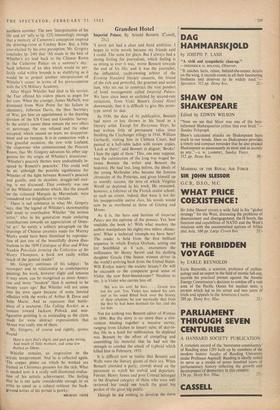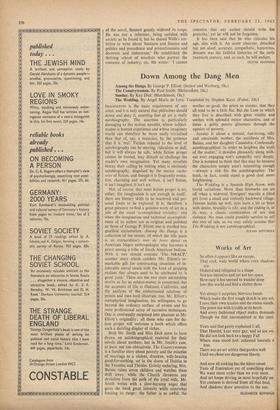Grandest Hotel
'I HAVE not had a clear and fixed ambition. I began to write novels because my friends said 1 could. The same for plays. But I always had a strong feeling for journalism, which feeling is as strong as ever it was,' wrote Bennett towards the end of his life; and it was the journalist, the influential, yacht-owning arbiter of the Evening Standard literary causerie, the friend of the rich and powerful, the gourmet and social lion, who set out to construct the vast pandect of hotel .management called Imperial Palace. We have since been so surfeited by second-rate imitations, from Vicki Baum's Grand Hotel downwards, that it is difficult to give this proto- type novel its due.
In 1930, the date of its publication, Bennett had more or less thrown in his hand as a literary artist. Except for Riceyman Steps, he had written little of permanent value since finishing the Clayhanger trilogy in 1916. William Gerhardi, visiting him in Chiltern Court, had paused at a hall-table laden with review copies. 'Look at them!' said Bennett in disgust; 'Books! I hate the sight of them.' This, one may suppose, was the culmination of the long war waged be- tween Bennett the writer and Bennett the hedonist. He had lost, long before, the ideals of the young Methodist who became the famous chronicler of the Potteries, and given himself up to worldly success, the love of which Virginia Woolf so deplored in his work. He remained, however, a follower of the French realist school; to such an extent, indeed, that were it not for his insuppressible native elan, his novels would now be as moribund as those of Gissing and Moore.
As it is, the hero and heroine of Imperial Palace are the epitome of the prosaic. Yet, how readable the book is! With what mastery the author manipulates his eighty-two minor charac- ters! What a technical triumph we have here! The reader is held from the first brilliant sequence in which Evelyn Orcham, setting out for Smithfield at 4 a.m., encounters the millionaire Sir Henry Savott and his dashing daughter Gracie ('the fastest woman driver in the world') arriving back from the United States. Will Evelyn marry the society beauty? Or will he succumb to the competent good sense of Violet, the new floor-housekeeper? Needless to say, it is Violet who carries him off.
She was his sort: he hers. . . . Gracie was not his sort. Yes, Violet was indeed his sort, and as his mind flitted back over the history of their relations, he saw mystically that from the first he had been destined for her, and she for him.
Not for nothing was Bennett editor of Woman in 1896. But the story is no more than a con- vention binding together a massive survey, ranging from kitchen to luxury suite, of day-to- day life in a hotel for millionaires. So depleted was Bennett by the effort of compiling and assembling his material that he had not the strength to combat the attack of typhoid which killed him in February, 1931.
It is difficult now to realise that Bennett and Wells were the literary giants of their era. When Bennett attended a party, crowds stood on the pavement to watch his arrival and departure. Forster, Henry James and poor Conrad belonged to the despised category of those who were well reviewed but could not touch the great big pocket of the great big public.
Though he did nothing to develop the form of the novel, Bennett greatly widened its scope. He was not a reformer, being satisfied with society as he found it, but he shared Wells's am- bition to write about `business and finance and politics and precedence and pretentiousness and decorum and indecorum.' He established the thriving school of novelists who portray the romance of industry, etc. He wrote: 'I cannot conceive that any author should write for posterity,' yet he will not be forgotten. It has been said that he who ridicules his age, dies with it. An acute observer, detached cc but not aloof, accurate, sympathetic, humorous, th Bennett was the faithful historian of the early twentieth century, and, as such, he will endure.
OLIVIA MANNING



































 Previous page
Previous page